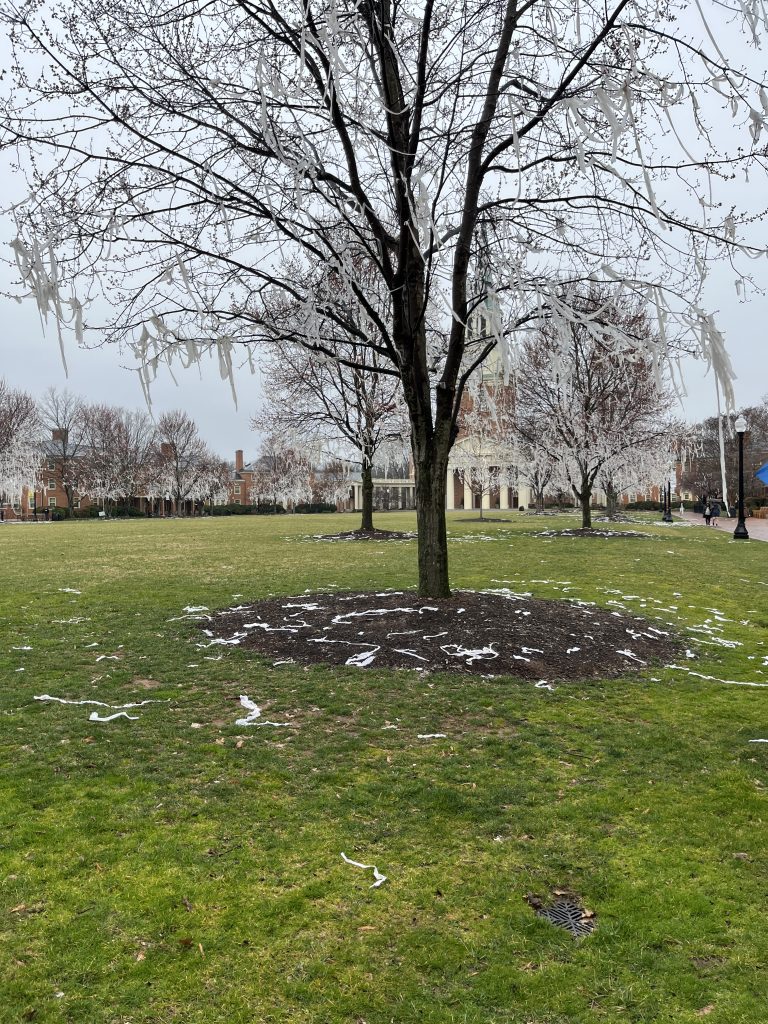Enduring relationships take root at Wake Forest
Feb. 28, 2024
Wake Forest University admits only a quarter of those who apply to the liberal arts school of about 5500 undergraduates and 3000 graduate students. In the scores of colleges I’ve visited, I’ve usually found that the more selective the school, the less they care about facilitating counselor visits. Nevertheless, the very-selective Wake welcomed my group of 40 HECA counselors not only with open arms, but with hot coffee and Krispy Kreme donuts (founded nearby).
Located in Winston-Salem, Wake Forest’s 340-acre campus was starting to show signs of North Carolina’s spring, with daffodils, cherry trees, and tulip magnolias already abloom. My photos are few, since the chilly rain and oversized yellow-and-black WF umbrellas (courtesy of WF admissions) made handling my phone camera a challenge.
The law, medicine, and business schools are about 3 miles away on a separate campus in downtown Winston-Salem. Engineering and other STEM students also attend classes there, via a 10-minute shuttle ride to a repurposed tobacco factory.
Small classes, engagement with professors
Classes are purposely kept small to accommodate discussion-based classes, with the average size at 20 and more than half 15 or fewer. “Personal connections define the Wake Forest experience,” said Lowell Tillet, the associate dean of admissions and a Wake alum. Professors want that engagement with students; student panelists emphasized the connections they’d formed here.
The mid-sized school hits the sweet spot of being big enough to have great resources while being small enough to really connect with both faculty and peers. Sixty percent do faculty-mentored research as undergrads.
You apply to the school as a whole and declare your major in your fourth semester. True to its liberal arts core, Wake Forest wants you to go broad and take a generalist approach. They want you to discover passions you didn’t even know about when you were in high school.
First-years live in the same section of campus, and students must live on campus for three years. Wake wants to make sure each voice is heard and that no one falls through the cracks. The Office of Personal and Career Development has students networking beginning their first year.
Study abroad programs are strong, and 85% participate. Wake feels it helps create a well-rounded student. The university owns residential buildings for students in London, Vienna, and Venice. (They own a palace on the Grand Canal!) Even engineers and pre-med students are able to study abroad or in DC.
Diversity and service matter at Wake Forest. Their seal bears pro humanitate, “for the people,” and 98% of students do some sort of service. Student identity groups are growing; a third of the undergraduates are people of color.
The arts thrive at Wake Forest, along with sports. They play against Duke and UNC in the ACC. Division I athletes aren’t segregated from the rest of students. Both athletes and students in the fine arts can win scholarships.
TP-ing trees for win over Duke

School spirit is lively both at the games and afterward, as evidenced by the toilet-papered trees that bore witness to the celebration of the Deacons’ win over Duke the previous weekend.
Applying to Wake Forest
Wake meets 100% of demonstrated need with grants, scholarships, work-study, and loans. You must fill out FAFSA and the CSS Profile. This year, with the FAFSA fiasco, they’re relying on the Profile. If you want to qualify for scholarships, get your application in by Nov. 15. Roughly half the admitted students come from Early Decision, with recruited athletes about 6-8% of that pool. Wake Forest has been test-optional for 15 years and will continue to be.
Admissions told us that in your application, they are looking for real “people.” Share your voice. Showcase your strengths. The elective short-answer prompts are important. “We really do value the essay,” said Tillett of admissions. You’re automatically reviewed for merit aid, but only 6-8% receive any.
Greek life has a presence, say student panelists, but it’s possible to have a social life without it.
Asked to sum up Wake, one student used the words “collaborative, lively, and spirited” and another said “community, opportunity, and personal.” Enduring relationships take root at Wake Forest and grow.